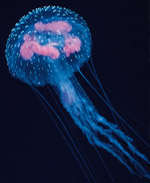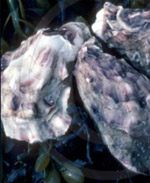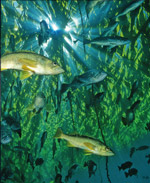- Climate change impacts on marine ecosystems
- > There can be no doubt that climate change will alter marine life. Changes in ecosystems usually have multiple natural causes, but increasing carbon dioxide levels in the atmosphere and global warming are now playing a critical role. The extent of the coming disruption to biotic communities is unknown.

Impacts and repercussions
Global climate change will inevitably lead to more or less simultaneous changes in numerous environmental variables during the coming decades and centuries. How strongly individual species and communities are affected by these changes depends on a variety of factors. It is not yet possible to estimate to what extent the living conditions in various marine ecosystems will change regionally. Antarctic planktonic algae could actually benefit from the warming of seawater, just as freshwater species in the eastern Baltic Sea could benefit from a salinity decrease in their ecosystem. In some habitats, the introduction of foreign species could even increase the species diversity for a time. In most cases, however, a geographical shift of environmental parameters will lead to a stress situation that exceeds the tolerance of some organisms. For example, due to future warming, the bladderwrack, which is adapted to cold water, will be stressed beyond its tolerance limits at the southern margin of its distribution off Portugal. This abiotic stress would also be intensified if the change occurred more rapidly than the species could adapt to it. Species that cannot adapt to the abiotic changes will have to retreat to more favourable habitats in order to survive. But if they cannot spread rapidly enough or far enough, or cannot assert themselves in their new communities, they will die out. In both cases a local displacement of species can be expected. Sensitive species will disappear while opportunistic, more adaptive species will become more abundant. These will also include many introduced, alien species. A restructuring of the species makeup of a community can eventually change the functionality of the community. Which ecosystem functions the marine communities perform in the future, whether the existing communities perform them better or worse, whether functions performed in the past completely disappear or just shift seasonally or spatially, all of this depends on whether the ecological functions of a disappearing species can be taken over by the species present or those newly introduced. In individual cases ecosystems may be able to cope with the regional changes of the species community, for example through immigration. But from a global perspective, species will be lost and ecosystems will undergo fundamental change. The potential consequences of the loss of a species are impressively illustrated by the classic example of the sea otters native to kelp forests. Sea otters feed, in part, on sea urchins, which eat kelp. Because in the past sea otters were extensively hunted in some areas, sea urchin populations burgeoned, leading to the widespread destruction of kelp forests. Consequently not only were habitats changed, but even the near-coastal currents were altered in some areas.



